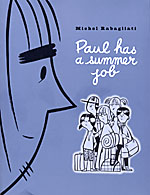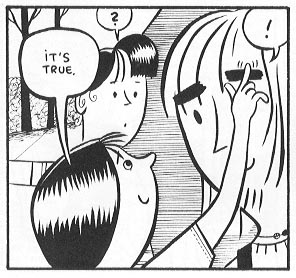 By Michel Rabagliati
By Michel Rabagliati
144 pages, black and white
Published by Drawn & Quarterly
It’s always fascinating to watch someone come into comics at an older age than most others, because their approach is fueled by completely different things. Michel Rabagliati read French graphic albums as a child, but it wasn’t until much later in his life that he started first creating comics for Drawn & Quarterly. With each work the audience has gotten to watch Rabagliati refine his skills, and his newest graphic novel, Paul Has A Summer Job, is easily his most accomplished creation to date.
Paul dropped out of high school when administrators took away the one thing he had to look forward to—a fully-funded art project to create a series of murals—was taken away from him. Trying to find employment, the future looked to be a mind-numbingly dreary… until Paul got the opportunity to work at a summer camp for under-privileged children. Paul thought it would be fun and some quick cash, but what he didn’t expect was to learn a lot about children, women, and of course, himself.
In many people’s hands, the basic plot of Paul Has A Summer Job would have come across poorly, but Rabagliati infuses a sense of wonder and innocence into his story that turns it into something special. Rabagliati’s semi-autobiographical story isn’t afraid to show Paul stumble early on, the better with which to contrast his eventual behavior as his self-confidence and understanding increases. It’s an enthralling journey towards manhood to watch, because he’s able to make it seem both real and sympathetic; as Paul re-examines his own life, it’s tough as a reader to not do the same thing. There’s a nice sense of humor on display here along with all of the internal growth, mind you. Paul’s “Daniel Boone” dreams when he first arrives at the bare-bones camp are hysterical, and the fun they have with the children is positively infectious. It’s a great balance between humor and drama, and both sides of the book bring a lot to the final product.
 Rabagliati’s European influence is best seen in his bare-bones art. Like such great masters of the form like Hergé, Rabagliati draws his characters with a minimal number of lines. A quick line for the nose, dots for the eyes, squiggle in a mouth and a couple extra lines for hair, and his characters are ready to roll. What’s amazing about this, though, is how expressive and emotive these characters end up being. When Paul is working at the printing press, you can see a real sense of despair on his face, one that is evident with or without narrative text. Likewise, Paul’s farewell scene with Marie is all the more touching because you can see how much he really cares about her in his bittersweet smile and sad eyes. For someone so relatively new to comics, it’s great to see how well Rabagliati understands the medium.
Rabagliati’s European influence is best seen in his bare-bones art. Like such great masters of the form like Hergé, Rabagliati draws his characters with a minimal number of lines. A quick line for the nose, dots for the eyes, squiggle in a mouth and a couple extra lines for hair, and his characters are ready to roll. What’s amazing about this, though, is how expressive and emotive these characters end up being. When Paul is working at the printing press, you can see a real sense of despair on his face, one that is evident with or without narrative text. Likewise, Paul’s farewell scene with Marie is all the more touching because you can see how much he really cares about her in his bittersweet smile and sad eyes. For someone so relatively new to comics, it’s great to see how well Rabagliati understands the medium.
Paul Has A Summer Job is Rabagliati’s longest work to date, and I don’t think it’s a small coincidence that it’s also his most accomplished. Rabagliati knows just how to tweak a real experience into an enthralling story, and in the already overcrowded genre of comic book biography, Rabagliati is a shining star. Seeing in his biography that he’s already working on another project starring his Paul alter-ego is some of the best comic book news I’ve heard all year.
